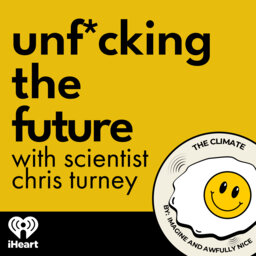Fighting Climate Anxiety with Dr. Lise Van Susteren
Psychiatrist and activist Dr. Lise Van Susteren joins to discuss her pioneering work in understanding and managing the mental health risks associated with "climate anxiety."
Show notes from Chris:
- The heartbreaking 2021 global survey on ‘Climate anxiety in children and young people and their beliefs about government responses to climate change’ was led by Caroline Hickman at the University of Bath and is freely available from The Lancet by clicking here.
- There is a wealth of amazing online resources that show how to turn anxiety into meaningful action. For inspiration, check out this super readable BBC article on ‘How young people are changing activism’.
In 1 playlist(s)
Unf*cking the Future
Unfucking the Future takes us on an environmental journey with our knowledgeable guide, scientist Ch…Social links
Follow podcast
Recent clips

Blue Carbon with Sanjayan
32:43

Greening Cities with Kotchakorn Voraakhom
27:52

Wildfires with Glynis Humphrey
29:35
 Unf*cking the Future
Unf*cking the Future